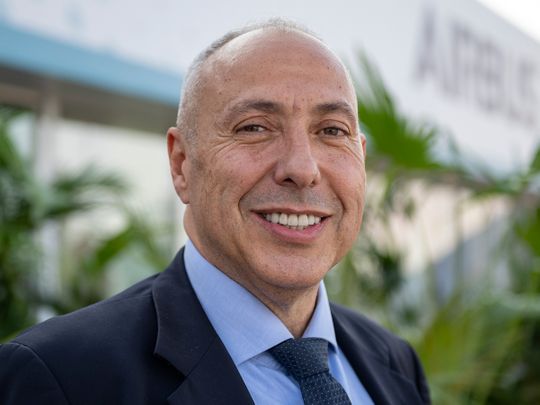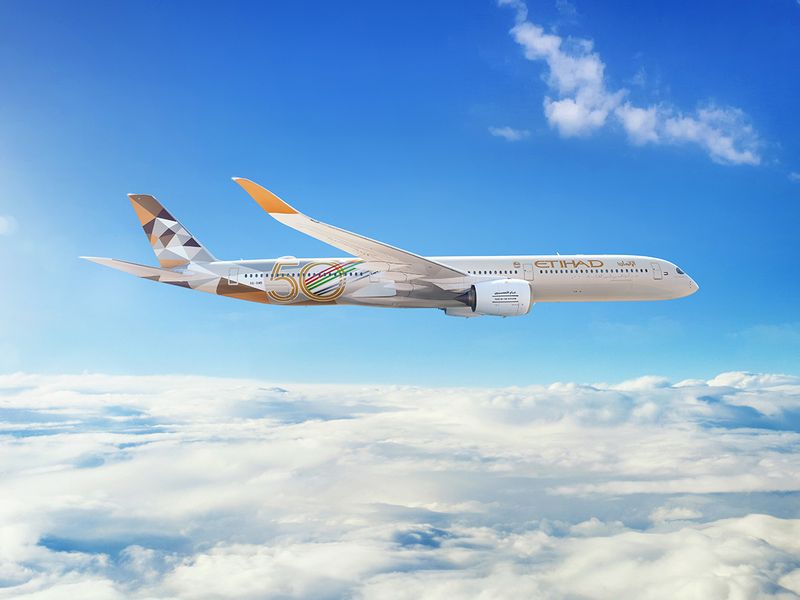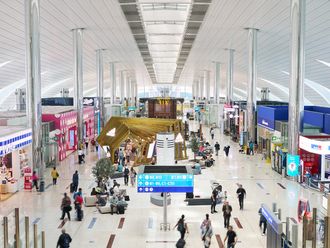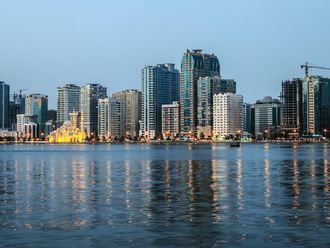
Dubai: Qatar Airways and Airbus have moved on from their dispute over the A350s and undertaken a repair project to get the planes back in the skies, according to a senior official with the European aircraft maker.
Mikail Houari, President of Airbus’ Africa and Middle East operations, stressed that the settlement was not an admission of liability for either party. He also projected short-term pressures to air traffic because of a bleak global GDP outlook.
IATA, in its December report, said international traffic in 2022 climbed 152.7 per cent vs 2021 and reached 62.2 per cent of 2019 levels. How do you see the trend holding up in 2023?
Also read
Air traffic has been recovering continuously since travel restrictions were lifted, with a few notable exceptions. We expect short-term pressures from limited global GDP outlook, fluctuations in oil price and higher inflation, but these are likely to normalise within a few years. According to our latest forecast, demand for passenger traffic will grow annually by 3.6 per cent over the next 20 years.
According to your new annual report, gross commercial aircraft orders increased to 1,078 compared to 771 in 2021. Any projections for 2023?
Clearly, there is demand for Airbus products as demonstrated by the strong order book. While orders will remain strong, we can't expect every year to be a record one. The Airbus backlog stands at over 7,200 aircraft.
Assuming no additional disruptions to the world economy, air traffic and our ability to deliver products and services, our target is to achieve 720 commercial aircraft deliveries in 2023.
Airbus and Qatar Airways recently settled their dispute over the grounded A350 jets. How was this agreement reached?
Qatar Airways and Airbus are pleased to have reached an amicable and mutually agreeable settlement in relation to their legal dispute over A350 surface degradation and the grounding of A350 aircraft. A repair project is now underway and both parties look forward to getting these aircraft safely back in the air.
The details of the settlement are confidential and the parties will proceed to discontinue their legal claims. The settlement agreement is not an admission of liability for either party. This agreement will enable Qatar Airways and Airbus to move forward and work together as partners.
What kind of delays are you facing because of labour shortages affecting European countries right now?
We have moved from demand to supply pressures. The uncertainties along the supply chain are likely to continue for some time. But we also see that the overall supply chain challenges appear to be stabilising.
We maintain our assessment that the situation on the supply side will remain difficult in 2023. We have taken strong measures to deal with this additional complexity and to protect our ramp-up.
After 18 months of stability, our suppliers have transitioned from a full COVID-19 crisis mode to a ramp-up mode. This happens in a context of high prices, low stocks and re-hiring. We provided more visibility to suppliers than before - and this also gives us better visibility on their side for potential operational difficulties.
What’s next in the partnership with Etihad with respect to the A350?
Airbus’ Sustainability Engagement Program aims to investigate ways of improving aviation’s environmental performance, by providing a holistic view of short and long-term initiatives surrounding the Airbus fleet.
The Airbus A350 lies at the base of the ‘Sustainability50’ program, a partnership with Etihad, formed in 2021 to support the UAE’s road to achieving net zero emissions by 2050. The A350-1000 is setting new standards in air travel, with a 25 per cent reduction in fuel burn and emissions.

As part of our partnership with Etihad, we are working on exploring channels of cooperation in various areas such as sustainable aviation fuel, waste and weight management, and data driven analysis etc.
Are similar alliances in the works with other regional airlines such as Emirates?
Airbus is working towards the decarbonisation of aviation and is fully aligned with other industry actors. The journey to achieve Net Zero requires collaboration and investment and we are always open to opportunities and partnerships that have the potential to advance the decarbonisation of the aviation industry.
How much time do you anticipate it will take global airlines to fully transition to sustainable aviation fuel?
Over 100 million litres of SAF were produced in 2021 and according to IATA, more than 50 airlines around the world have experience with SAF. SAF can reduce emissions by up to 80 per cent on average during its full lifecycle.
The main challenge remains the emergence of a market to generalise the use of SAF. SAFs would have to be massively scaled up, and this could require investment anywhere from $10 billion to as much as $40 billion and upwards.
Currently, all Airbus commercial aircraft are capable of flying with an up to 50 per cent SAF blend mixed with kerosene and are targeted to be capable for 100 per cent SAF use in flight by the end of this decade.
Are all airlines, governments and fuel suppliers prepared for this transition?
This is a journey that all industry stakeholders have to collaborate on to achieve the desired outcome. There is a rising momentum in the aviation sector as governments and airlines align sustainability goals. We are already seeing governments and private sector undertake projects and announce initiatives to enhance sustainability (and) decarbonise the sector.
Which are the key markets that are specifically buying the A350?
We currently have 925 A350s on order from 54 customers. Qatar Airways is the largest operator of the A350, but we expect there to be ongoing demand for the aircraft as regional airlines move towards fleet modernisation and undertake carbon reduction initiatives.
The A350 family is a leader in sustainability fitted with the latest innovations that are redefining the future of flying. The A350 offers 25 per cent less fuel burn and CO2 emissions and 50 per cent less noise footprint compared to previous generation aircraft. Its versatility is evident with its flying range of up to 9,700nm/18,000 km.
What steps has Airbus taken to reduce its carbon footprint? Do you think it’s justified to target the aviation industry alone for carbon dioxide emissions?
We want to take a leadership position and are accelerating our own decarbonisation journey. We aim at reducing our industrial environment footprint at sites worldwide, developing a more circular model to optimise use of materials and reduce use of critical resources, and enhancing our product and services portfolio to positively contribute to climate change mitigation and adaptation.
We have the ambition to develop the world’s first zero-emission commercial aircraft by 2035 to ensure future generations can enjoy flying as much as we do. The aviation industry represents approximately 2.5 per cent of global human-induced CO2 emissions, surpassing the emissions contribution from many other industries.
We believe that aviation is not the problem but emissions are. Aviation will remain an essential mode of travel for the world, while being a crucial sector to many economies of the world in terms of its contribution to the gross domestic production.
Air India will acquire 250 Airbus aircraft. Over what duration will these planes be delivered?
The commitment includes 140 A320neo and 70 A321neo single-aisle aircraft as well as 34 A350-1000 and six A350-900 wide-body jets that will mark a new era for the country as the all-new, long-range aircraft celebrates its debut in the Indian market. Deliveries are set to commence with the first A350-900 arriving by late-2023.







